|
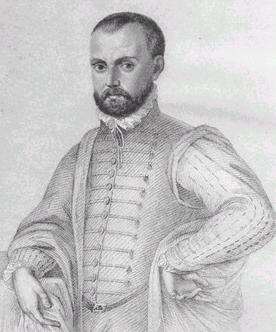
Click on this portrait of Machiavelli to visit a
very detailed page about his life and work.
In 1512 Niccolò Machiavelli lived in exile in San
Casciano, near Florence in the village Sant'Andrea in
Percussina. He lived in near poverty, but today the main street in
San Casciano is named for him, Via Machiavelli. The following
images give an idea of the landscape Machiavelli enjoyed. It's
said his exile was made the worse for being able to see his beloved
Florence in the distance.
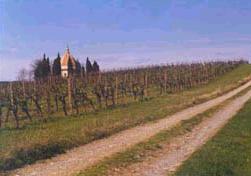

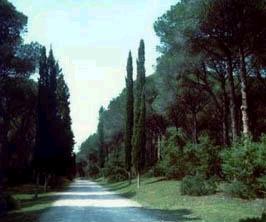
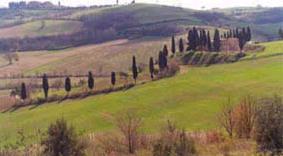


Machiavelli's family home, the
villa l'Abergaccio, is now linked to a winery/luxery hotel. Click
on the images above to read about the wine they produce.
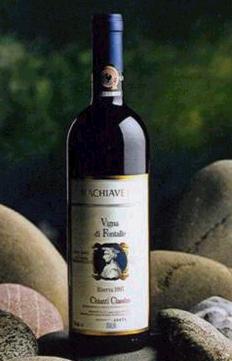
Click on the bottle of Machiavelli wine to read
about the history of the winery and the vineyards from
which the wine is produced.
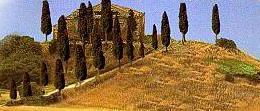
Click on the view of Tuscany to visit the
Tuscany.net site's description of the Hotel Villa Casagrande, the
winery/luxury hotel on Machiavelli's old estate.

Another 'believe it or not'...Machiavelli's home is
also the seat of the Consortium for the Classic Chianti Wine, the Black
Rooster mark. Click on their logo to visit their website that has
photos of Machiavelli's home town, and home.
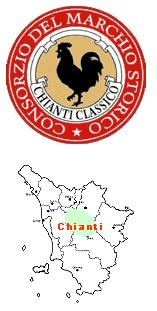
Click on the Chianti logo and map to visit the
Farmhouse Rental site's page that describes the Chianti area and how to
get there when in Italy.
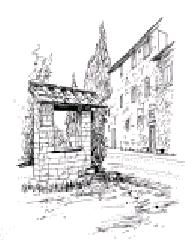
I love this one. Click on the drawing of
Sant'Andrea to read about a restaurant that claims to have been a
favorite haunt of Machiavelli's. Machiavelli wrote to a friend
that he spent his days in peasant's clothes dealing with family and
estate issues. Then in the evenings he donned the clothes he had
worn
when he was an emissary to heads of state for the Florentine Republic,
and wrote his books for four blissful hours each evening. But
according to this restaurant, he really spent his days playing cards,
and eating and drinking at their place.

Click on the logo above for the Anecdotage.com site
where you can read anecdotes about Machiavelli and Democracy. Just
enter the word in their search box.
 Click on the above logo to go to the University of
Adelaide's Library site where you can connect to online copies of all of
Machiavelli's major works. This is the site to which the section
headings at the bottom of this page link.
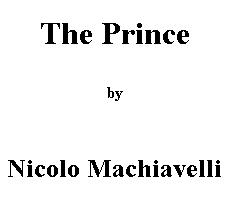
Click on the title above to go directly to the
first page of an online version of 'The Prince'.
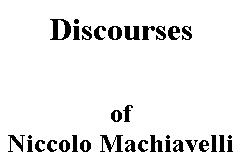
Click on the title above to go directly to the
first page of an online version of 'The Discourses'.
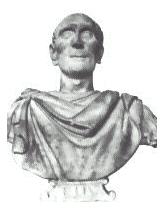
The Ancient Roman historian Livy wrote 142 books on
the History of Rome from it's Foundations published from 26 B.C. to 17
A.D.. Click on the scary image of Livy above to read more about
him and his work.

Click on the image of the ancient tree above to
visit the Livius - Articles on Ancient History site. They offer
nearly 1500 pages of very interesting histories on eras, events and
famous persons from Ancient History.
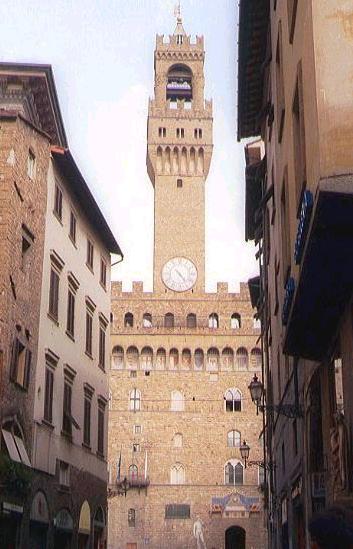
Machiavelli worked for the short-lived Florentine
Republic in the Town Hall, 'Il Palazzo Vecchio', when he wasn't
traveling as an emissary to other states. It was said he moved
around so much and so quickly doing his work that the correspondence
sent by his employers was often addressed: "To wherever the
devil he is now...".


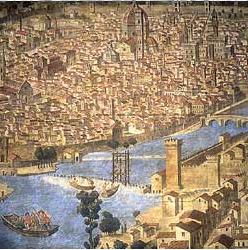 The
Terra di Toscana site has invented an 'impossible interview' with
Machiavelli. It is actually very entertaining and edifying.
Click on one of the images from their site to go directly to the
interview.
Free e-books of The Prince and The Discourse are available
from Project Gutenberg, the grand-daddy of free e-book websites.
|
Introduction
The
Realities of Machiavelli’s Era
Ancient
Democratic Republics
Democracy
Illiberal
and Liberal Democracies
Republics
Machiavelli
and his Republican Ideal
Conclusion
Books
by or About Machiavelli
The
Discourses
Section Headings - Links
Niccolò
Machiavelli (b.1467-d.1527) has gotten a bad rap.
He is not an amoral despot-maker and early spin-doctor.
He is a Renaissance-era political scientist and historian.
And that famous adjective, Machiavellian, is described in at least one
Italian dictionary as: 'The mistaken utilitarian interpretation of
Machiavelli's writings'.
His
famous, or infamous, book Il Principe (The Prince)
is not
really “Despotry for Dummies”, but an expert description of the
efficient functioning of a Principality, which was in those
times,
actually, from the beginning of human city-dwelling 10,000 years ago,
the primary form of political governance.
For
us today, The Prince may seem cynical and amoral, a detailed plan
for separating morality from politics, the ultimate real politick.
But our era’s interest in social progress, moral actions by
governments, and the improvement of the human condition for everyone on
the planet, are, sadly, relatively new interests.
Political
rulers in Machiavelli’s time had to take territory, defend it, repress
local peoples, protect supply lines to garrisons in occupied lands,
subdue local leaders, and fend off other Princes who wanted to steal it
all away.
These
Princes were not prince-charmings or in any way similar to today’s
show-princes of Europe. They
were brutal, cunning, deceitful warriors who used every means possible
to do whatever was necessary to maintain control in their territories.
To
better understand Machiavelli and the realities of his era in terms of
today’s world, one needs an understanding of democracies and republics
both liberal and illiberal. These words have taken on popular meanings, but as I’m
writing about Political Science, I’m using their Political Science
meanings here. I explain
those meanings briefly in the next sections.
Ancient
Democratic Republics
Before
Machiavelli’s time there are two famous, and rare, examples of
republics (voting by citizens) with limited democracy in early history: the
republic in Ancient Greece, and the republican era in Ancient
Rome.
Each
suffered very limited suffrages,
thus limiting their actual representation of the will of the people.
They also lacked institutions, laws, and courts strong enough to
enforce the rights of the voting public against despotic tendencies and
excesses in their leaders.
The
choice to exclude vast portions of society from the suffrage was an
effort to keep control of the government in the hands of a like-minded,
wealthy, conservative elite. They
felt strongly that they had to deny rights to people they considered
lesser human beings, such as women, slaves, naturalized citizens and the
less educated.
In
Ancient Greece, the famous philosopher Aristotle complained when the
suffrage was broadened, writing: “Republics
decline into democracies, and democracies decline into despotisms.”
To
be precise, democracy means governing power comes from the people by
some means, such as voting (in a republic), caucuses, referendums in
direct democracies, or even via party or faction-appointed
representatives.
The
power is then instilled in those who govern.
Because the power comes from the people, if the representatives
do a poor job, the power can be taken back and given to someone else.
That’s the ideal version of a
democracy, and
that’s the glory of democracy.
It’s
the best system developed to-date to govern diverse groups of people, to
protect the rights of minorities in societies, and to keep down that
all-to-human tendency to corruption and excess.
Churchill
famously said: “No
one pretends that democracy is perfect or all-wise. Indeed, it has been
said that democracy is the worst form of government, except for all
those other forms that have been tried from time to time.”
It’s
proven itself the best system found for governing with respect for human
rights and the rights of the individual.
Illiberal
and Liberal Democracies
But
not all democracies are liberal democracies.
A liberal democracy allows for multiple political parties,
regular elections, free discussion of the issues, criticism of the
elected officials, free association of political organizations.
There are many illiberal democracies around.
Communist countries called themselves democracies and republics
because people voted for their leaders, but there were so many
restrictions on discussion and association that there was no real
competition between candidates or policies.
Many
of today’s illiberal democracies are relatively new democracies.
An illiberal democracy is often used as a bridge between
authoritarian/totalitarian societies and liberal democracies.
People
who are authoritarian in their personal lives and who are used to living
under an authoritarian system are rarely comfortable with a sharp shift
to what they see as a chaotic form of government that allows
dissension,
opposing policy proposals, and criticism from opposing political
parties.
It
is also true that the newly formed political parties and electorates are
not used to a system in which they can speak freely, and too often speak
irresponsibly, inciting violence and hatred.
Another
novelty that is often difficult for a new democracy to comprehend
is
that political parties can lose elections.
The idea of working in opposition to shape legislation and policy
is not clearly understood, prompting election boycotts, unfounded accusations of
wide-scale fraud, or violent riots when parties lose.
Writer
James Baldwin expressed just that idea when he wrote:
“Words like ‘freedom’, ‘justice’, ‘democracy’ are
not common concepts; on the contrary, they are rare.
People are not born knowing what these are.
It takes enormous and, above all, individual effort to arrive at
the respect for other people that these words imply.”
But
the long-term trend is to more liberal democracies that allow for more
individual choice, self-determination, and diversity of opinion and
behavior, thus to more respect for individual human rights.
This
trend exists largely because there is also a long-term trend to
improving educational systems around the world.
And there is a clear link between greater levels of higher
education of citizens, and greater respect for individual human rights.
It
would seem that the more people understand the world around them, the less they
fear the world around them.
It’s
said that people get the leaders they deserve, and, at least in a
republic, the just desserts are earned through voting for them.
But Thomas Jefferson did write:
“A democracy is nothing more than mob rule, where fifty-one
percent of the people may take away the rights of the other
forty-nine.” (It sounds
like the father of the U.S. Liberal Democratic Republic must have been
having a bad day, or had just lost an election.)
But
then again, perhaps it is because he felt this way that he and the other
Founding Fathers, the framers of the U.S. Constitution, ensured that the
need for laws enforced by independent courts, and a government full of
checks on power and balances that could redress injustices and excesses
in any branch of the government, were enshrined in the U.S.
Constitution. It’s when
these elements are missing that democracy gets a bad name.
It’s
said that attempts at pure socialism eventually fail because it’s an
ideology based on a flawed assumption about human character: that
a majority of the people will act for the good of society.
It's also said that a liberal democratic republic works because it’s based on
the assumption that each person will vote for what is personally best
for him, and those collective selfish votes add up to what is best for
the society as a whole, at least until the next election.
Machiavelli
and his Republican Ideal
The
entire intellectual life of Machiavelli was shaped by his dedication to
the republican ideal. When the Medici, the Princes who ruled Florence, were
expelled by a revolution in 1494, Machiavelli became a diplomatic
representative of the new Florentine Republic. But when the revolt
against the Medici was over by 1512, and the Princes returned to power,
Machiavelli was jailed and tortured, and then released into exile.
In
exile he wrote The Prince, a spare book of less than 100 pages.
As one of his translators, W. K. Marriott, writes, the work
contains truths as applicable today just as they were yesterday.
And he offers these as examples.
-
“Men
are still the dupes of their simplicity and greed...
-
The
cloak of religion still conceals the vices...
-
Men
will not look at things as they really are, but as they wish them to
be--and are ruined.
-
In
politics there are no perfectly safe courses; prudence consists in
choosing the least dangerous ones.
-
Although
crimes may win an empire, they do not win glory.
-
Necessary
wars are just wars.
-
The
arms of a nation are hallowed when it has no other resource but to
fight.”
But
what most people don’t realize is that Machiavelli wrote The Prince
as a companion piece to Discorsi sulla prima deca di Tito Livio (Discourses
on the First Ten Books of Titus Livius).
Livy was a prolific Ancient Roman historian.
The Discourses was the major work of the two books; a
comprehensive book of several hundred pages in three volumes describing
and lauding Ancient Rome’s republican era.
In
The Discourses, Machiavelli describes where Rome went wrong,
where it went right, and how it should have dealt with both internal and
external threats. And in
his later book, Istoria Fiorentine (The History of Florence
and of the Affairs of Italy), he again lauds republican principles.
He saw them as the way forward for an increasingly enlightened
mankind. Republics also offered a continuity and stability that
principalities do not offer, often collapsing upon the death of the
Prince.
The
Discourses speak more to us today than The
Prince. The section
titles alone tell you that it would be a valuable read for today’s
world leaders. If you doubt this, look below, where I’ve put
The Discourses' section titles, linked to the Adelaide
University site in Australia where you can read the section if you wish.
Machiavelli
ends The History of Florence by stating that if it takes a
despotic Prince to unite Italy, then so be it, but that he would wish
that the government of a united Italy would embrace a representative
government. This is hardly
a Machiavellian desire, as the adjective is used today.
Niccolò
Machiavelli would surely be shocked to learn that in this day and age
he’s viewed, because of The Prince, as the master-class teacher
of tyranny, the writer of do-it-yourself despotry, the tutor to
totalitarian governments, the most inhumane and unenlightened form of
government ever known to man!
My list of books by or
about Machiavelli at Amazon.com To
widen your search about the era or his comtemporaries, you can use this
Search tool for Amazon.com. Just
enter 'Books' in the 'Search' field, and names and words in the 'Keyword'
field (for example 'Republic of Florence' or 'Borgia'). Then click on the 'Go' button to see what's available, what
people's comments about the books are, and what they cost.
|
|

